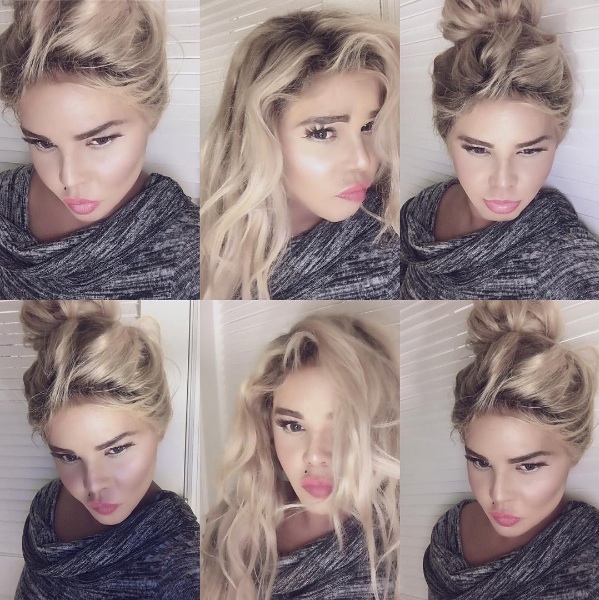
“Beauty begins the moment you decide to be yourself.” ~ Coco Chanel
Regardless of your musical tastes, there is no denying the statement that Lil’ Kim’s transformation makes—not just about beauty, but also about race.
The reason behind her new and different look? She says that she suffers from low self-esteem, mainly stemming from comments from the men in her life.
But the problem doesn’t truly end or begin there.
The real issue is why Lil’ Kim—and countless others—feel compelled to bleach their skin and undergo countless surgeries in order to feel beautiful.
A healthy sense of self does begin within, but it also has to be taught. It is mirrored to us by women we grow up with and trust. If the society or culture that we are immersed in lacks the mentality of individuality, then women are more likely to grow up believing that there is only one standard of beauty.
Well, f*ck that.
I feel incredibly saddened that Lil’ Kim felt the need to take such drastic measures to change her appearance to the extent that she appears to be from a different ethnic background all together. I support her in making choices that feel right for her, but it doesn’t mean that it still doesn’t break my heart that she didn’t think her beautiful brown skin wasn’t good enough to begin with.
As a nation we are supposed to have come so far from the days Martin Luther King Jr. gave his “I have a dream” speech—but really how far is that exactly?
Are we still judging our brothers and sisters based on how much melanin is in their skin?
Do we still tell others that they are acting “white” or “black,” as if a race can be defined by a specific pattern of behavior?
The truth is that Lil’ Kim is a billboard for the racial injustices that our country still has pulsing beneath its skin, despite how many things have changed since desegregation.
We are free to choose how we look, but we are not free from the ideals that are set forth to us.
Black is f*ckin’ beautiful—but so is White, Asian, Latino and whatever other background we may represent.
We are beautiful because regardless of the pigment of our skin or eyes, or regardless whether we wear a weave or not—there is no one else like us in this world.
That is our greatest gift.
But it doesn’t end there—it won’t end until we start talking openly about race in a way that doesn’t make us fear retaliation for voicing our opinions or coming across as prejudiced.
No one wants to think they are prejudiced, yet no one actually wants to open up and talk about race.
Toni Morrison’s The Bluest Eye touches on these same topics—how the idealization of “European” features (such as blue eyes and blonde hair) affects many blacks as they are growing up.
This beauty ideal is not new, nor are the challenges many women (and men) face when they feel inferior—when they don’t just don’t meet the superficial and culturally-imposed standards that popular media sets forth.
What is new is that now we have the medical resources to change how we look even more dramatically, such as changing our skin color. But when we change ourselves so drastically, we are breaking up with a part of our cultural heritage. We are separating ourselves from a core part of our identity in order to take on this new persona that we feel will make us happier and more fulfilled.
Regardless of how much we change about ourselves, we can’t outrun those underlying feelings of not being good enough—and this is where the problem lies.
It comes from the popular media—those TV shows and movies that still show preferential treatment of white characters and even glorify the light-skinned black person as more desirable. We see this in magazines, too.
Maybe things are changing ever so slowly—but it’s still not happening fast enough.
As a country, we need to acknowledge that the playing field isn’t yet equal—that despite how far we’ve come as a nation, we still aren’t at that place Martin Luther King Jr. spoke of in his infamous speech.
Many see us as equals—not separated by skin color or physical features, but connected by a common good and the strength of a humanity determined to make a difference.
We need to not just speak of the acceptance of race in America but live it through the portrayal of families from all walks of life and backgrounds on television, and movies that don’t support the cultural stereotypes we have been spoon-fed since birth.
We need to first look within at our own uneasiness about race, then be confident in discussing this with others. We are responsible for the barriers—racial or otherwise—that we choose to uphold out of the possibility of discomfort.
We need to start showing young children that beautiful doesn’t mean fair-skinned and blonde, because smooth black skin and ebony eyes are just as valuable and amazing.
Let’s show our younger generations that being beautiful has more to do with how we choose to live than it does with how we look.
~
Author: Kate Rose
Editor: Renée Picard
Image: Screenshot from Lil’ Kim Instagram


Read 29 comments and reply